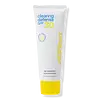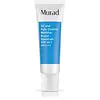What's inside
What's inside
 Key Ingredients
Key Ingredients

 Benefits
Benefits

 Concerns
Concerns

 Ingredients Side-by-side
Ingredients Side-by-side

Water
Skin ConditioningHomosalate
Skin ConditioningOctocrylene
UV AbsorberButylene Glycol
HumectantEthylhexyl Salicylate
UV AbsorberSilica
AbrasiveButyl Methoxydibenzoylmethane
UV AbsorberC12-15 Alkyl Benzoate
AntimicrobialButyloctyl Salicylate
Skin ConditioningVp/Eicosene Copolymer
Polyglyceryl-2 Distearate
EmulsifyingSaccharide Isomerate
HumectantTapioca Starch
Coriandrum Sativum Fruit Oil
MaskingCamellia Sinensis Leaf Extract
AntimicrobialSodium Ascorbyl Phosphate
AntioxidantSalix Alba Bark Extract
AstringentTerpineol
MaskingThymol
AntimicrobialCitrus Aurantium Dulcis Peel Oil
MaskingDipotassium Glycyrrhizate
HumectantTocopheryl Acetate
AntioxidantPotassium Cetyl Phosphate
EmulsifyingArachidyl Alcohol
EmollientGlyceryl Stearate
EmollientPEG-100 Stearate
Behenyl Alcohol
EmollientXanthan Gum
EmulsifyingAcrylates/C10-30 Alkyl Acrylate Crosspolymer
Emulsion StabilisingArachidyl Glucoside
EmulsifyingEthylhexylglycerin
Skin ConditioningTrisodium Ethylenediamine Disuccinate
Citric Acid
BufferingSodium Citrate
BufferingSodium Hydroxide
BufferingGlycerin
HumectantBisabolol
MaskingPentylene Glycol
Skin ConditioningPropanediol
SolventHydroxyacetophenone
AntioxidantCaprylyl Glycol
EmollientPotassium Sorbate
PreservativeSodium Benzoate
MaskingLinalool
PerfumingLimonene
PerfumingGeraniol
PerfumingCitronellol
PerfumingWater, Homosalate, Octocrylene, Butylene Glycol, Ethylhexyl Salicylate, Silica, Butyl Methoxydibenzoylmethane, C12-15 Alkyl Benzoate, Butyloctyl Salicylate, Vp/Eicosene Copolymer, Polyglyceryl-2 Distearate, Saccharide Isomerate, Tapioca Starch, Coriandrum Sativum Fruit Oil, Camellia Sinensis Leaf Extract, Sodium Ascorbyl Phosphate, Salix Alba Bark Extract, Terpineol, Thymol, Citrus Aurantium Dulcis Peel Oil, Dipotassium Glycyrrhizate, Tocopheryl Acetate, Potassium Cetyl Phosphate, Arachidyl Alcohol, Glyceryl Stearate, PEG-100 Stearate, Behenyl Alcohol, Xanthan Gum, Acrylates/C10-30 Alkyl Acrylate Crosspolymer, Arachidyl Glucoside, Ethylhexylglycerin, Trisodium Ethylenediamine Disuccinate, Citric Acid, Sodium Citrate, Sodium Hydroxide, Glycerin, Bisabolol, Pentylene Glycol, Propanediol, Hydroxyacetophenone, Caprylyl Glycol, Potassium Sorbate, Sodium Benzoate, Linalool, Limonene, Geraniol, Citronellol
Butyl Methoxydibenzoylmethane 3%
UV AbsorberHomosalate 10%
Skin ConditioningEthylhexyl Salicylate 5%
UV AbsorberOctocrylene 5%
UV AbsorberWater
Skin ConditioningTapioca Starch
Polysilicone-11
Methyl Methacrylate Crosspolymer
Propanediol Dicaprylate
EmollientButylene Glycol
HumectantCoconut Alkanes
EmollientCetearyl Alcohol
EmollientC20-22 Alkyl Phosphate
EmulsifyingEnantia Chlorantha Bark Extract
Skin ConditioningButyl Avocadate
Skin ConditioningRetinyl Palmitate
Skin ConditioningTocopheryl Acetate
AntioxidantAscorbyl Palmitate
AntioxidantSodium Hyaluronate
HumectantAllantoin
Skin ConditioningZinc Gluconate
Skin ConditioningGlycerin
HumectantOleanolic Acid
Skin ConditioningUrea
BufferingYeast Amino Acids
HumectantTrehalose
HumectantInositol
HumectantTaurine
BufferingBetaine
HumectantCoco-Caprylate/Caprate
EmollientHydrogenated Lecithin
EmulsifyingCoco-Glucoside
CleansingC20-22 Alcohols
Emulsion StabilisingLaureth-12
EmulsifyingPolyacrylate Crosspolymer-6
Emulsion StabilisingSodium Hydroxide
BufferingDisodium EDTA
Ethylhexylglycerin
Skin ConditioningPhenoxyethanol
PreservativeParfum
MaskingLimonene
PerfumingLinalool
PerfumingCitral
PerfumingButyl Methoxydibenzoylmethane 3%, Homosalate 10%, Ethylhexyl Salicylate 5%, Octocrylene 5%, Water, Tapioca Starch, Polysilicone-11, Methyl Methacrylate Crosspolymer, Propanediol Dicaprylate, Butylene Glycol, Coconut Alkanes, Cetearyl Alcohol, C20-22 Alkyl Phosphate, Enantia Chlorantha Bark Extract, Butyl Avocadate, Retinyl Palmitate, Tocopheryl Acetate, Ascorbyl Palmitate, Sodium Hyaluronate, Allantoin, Zinc Gluconate, Glycerin, Oleanolic Acid, Urea, Yeast Amino Acids, Trehalose, Inositol, Taurine, Betaine, Coco-Caprylate/Caprate, Hydrogenated Lecithin, Coco-Glucoside, C20-22 Alcohols, Laureth-12, Polyacrylate Crosspolymer-6, Sodium Hydroxide, Disodium EDTA, Ethylhexylglycerin, Phenoxyethanol, Parfum, Limonene, Linalool, Citral
 Reviews
Reviews

Ingredients Explained
These ingredients are found in both products.
Ingredients higher up in an ingredient list are typically present in a larger amount.
Also known as Avobenzone, this ingredient is a chemical sunscreen filter that provides protection in the UV-A range.
Avobenzone is globally approved and is the most commonly used UV-A filter in the world.
Studies have found that avobenzone becomes ineffective when exposed to UV light (it is not photostable; meaning that it breaks down in sunlight). Because of this, formulations that include avobenzone will usually contain stabilizers such as octocrylene.
However, some modern formulations (looking at you, EU!) are able to stabilize avobenzone by coating the molecules.
Avobenzone does not protect against the UV-B range, so it's important to check that the sunscreen you're using contains other UV filters that do!
The highest concentration of avobenzone permitted is 3% in the US, and 5% in the EU.
Learn more about Butyl MethoxydibenzoylmethaneButylene Glycol (or BG) is used within cosmetic products for a few different reasons:
Overall, Butylene Glycol is a safe and well-rounded ingredient that works well with other ingredients.
Though this ingredient works well with most skin types, some people with sensitive skin may experience a reaction such as allergic rashes, closed comedones, or itchiness.
Learn more about Butylene GlycolEthylhexyl Salicylate is an organic compound used to block UV rays. It primarily absorbs UVB rays but offers a small amount of UVA protection as well.
Commonly found in sunscreens, Ethylhexyl Salicylate is created from salicylic acid and 2-ethylhexanol. You might know salicylic acid as the effective acne fighter ingredient and BHA.
The ethylhexanol in this ingredient is a fatty alcohol and helps hydrate your skin, similar to oils. It is an emollient, which means it traps moisture into the skin.
According to manufacturers, Ethylhexyl Salicylate absorbs UV wavelength of 295-315 nm, with a peak absorption at 307-310 nm. UVA rays are linked to long term skin damage, such as hyperpigmentation. UVB rays emit more energy and are capable of damaging our DNA. UVB rays cause sunburn.
Learn more about Ethylhexyl SalicylateEthylhexylglycerin (we can't pronounce this either) is commonly used as a preservative and skin softener. It is derived from glyceryl.
You might see Ethylhexylglycerin often paired with other preservatives such as phenoxyethanol. Ethylhexylglycerin has been found to increase the effectiveness of these other preservatives.
Glycerin is already naturally found in your skin. It helps moisturize and protect your skin.
A study from 2016 found glycerin to be more effective as a humectant than AHAs and hyaluronic acid.
As a humectant, it helps the skin stay hydrated by pulling moisture to your skin. The low molecular weight of glycerin allows it to pull moisture into the deeper layers of your skin.
Hydrated skin improves your skin barrier; Your skin barrier helps protect against irritants and bacteria.
Glycerin has also been found to have antimicrobial and antiviral properties. Due to these properties, glycerin is often used in wound and burn treatments.
In cosmetics, glycerin is usually derived from plants such as soybean or palm. However, it can also be sourced from animals, such as tallow or animal fat.
This ingredient is organic, colorless, odorless, and non-toxic.
Glycerin is the name for this ingredient in American English. British English uses Glycerol/Glycerine.
Learn more about GlycerinHomosalate is a chemical sunscreen filter that provides protection in the UV-B range (280nm - 320 nm), with a peak protection at 306 nm. It is internationally approved for use in sunscreens.
Homosalate is not photo-stable, meaning it's strength as a UV filter degrades over time with exposure to the sun. Because of this, it's often used in combination with other chemical sunscreen filters as avobenzone (which protects from the UV-A range). Homosalate also helps act as a solvent for harder-to-dissolve UV filters.
(Part of the reason that sunscreens need to be frequently re-applied is due to the photo instability of many chemical sunscreen filters)
Currently, homosalate is approved in concentrations up to 10% in the EU and 15% in the US. The FDA is currently doing further research on the effects of homosalate, and it is possible that these approved concentrations will change in the future.
Learn more about HomosalateLimonene is a fragrance that adds scent and taste to a formulation.
It's found in the peel oil of citrus fruits and other plants such as lavender and eucalyptus. The scent of limonene is generally described as "sweet citrus".
Limonene acts as an antioxidant, meaning it helps neutralize free radicals.
When exposed to air, oxidized limonene may sensitize the skin. Because of this, limonene is often avoided by people with sensitive skin.
The term 'fragrance' is not regulated in many countries. In many cases, it is up to the brand to define this term. For instance, many brands choose to label themselves as "fragrance-free" because they are not using synthetic fragrances. However, their products may still contain ingredients such as essential oils that are considered a fragrance.
Learn more about LimoneneLinalool is a fragrance and helps add scent to products. It's derived from common plants such as cinnamon, mint, citrus, and lavender.
Like Limonene, this ingredient oxidizes when exposed to air. Oxidized linalool can cause allergies and skin sensitivity.
This ingredient has a scent that is floral, spicy tropical, and citrus-like.
Learn more about LinaloolOctocrylene protects skin from sun damage. It absorbs UV-B with peak absorption of 304 nm. It is a common sunscreen ingredient and often paired with avobenzone, a UVA filter. This is because octocrylene stabilizes other sunscreen ingredients by protecting them from degradation when exposed to sunlight. Octocrylene is a photostable ingredient and loses about 10% of SPF in 95 minutes.
Octocrylene also acts as an emollient, meaning it helps skin retain moisture and softens skin. It is oil-soluble and hydrophobic, enhancing water-resistant properties in a product.
Those who are using ketoprofen, a topical anti-inflammatory drug, may experience an allergic reaction when using octocrylene. It is best to speak with a healthcare professional about using sunscreens with octocrylene.
The EU allows a maximum of these concentrations:
Learn more about OctocryleneSodium Hydroxide is also known as lye or caustic soda. It is used to adjust the pH of products; many ingredients require a specific pH to be effective.
In small amounts, sodium hydroxide is considered safe to use. However, large amounts may cause chemical burns due to its high alkaline.
Your skin has a natural pH and acid mantle. This acid mantle helps prevent harmful bacteria from breaking through. The acid mantle also helps keep your skin hydrated.
"Alkaline" refers to a high pH level. A low pH level would be considered acidic.
Learn more about Sodium HydroxideTapioca starch is a thickening agent and is made from the cassava root, also known as yucca.
According to a manufacturer, it is an excellent talc replacement.
It is gluten-free.
Learn more about Tapioca StarchTocopheryl Acetate is AKA Vitamin E. It is an antioxidant and protects your skin from free radicals. Free radicals damage the skin by breaking down collagen.
One study found using Tocopheryl Acetate with Vitamin C decreased the number of sunburned cells.
Tocopheryl Acetate is commonly found in both skincare and dietary supplements.
Learn more about Tocopheryl AcetateWater. It's the most common cosmetic ingredient of all. You'll usually see it at the top of ingredient lists, meaning that it makes up the largest part of the product.
So why is it so popular? Water most often acts as a solvent - this means that it helps dissolve other ingredients into the formulation.
You'll also recognize water as that liquid we all need to stay alive. If you see this, drink a glass of water. Stay hydrated!
Learn more about Water